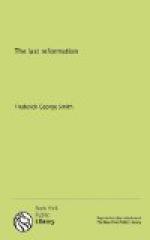The church of the Middle Ages was the natural fruitage of the seeds planted during the second and third centuries. There we began to notice particularly foreign elements which stand out in bold contrast to the simple forms of primitive Christianity. One of these innovations was the development of the ritualistic spirit, according to which undue importance was attached to particular forms of worship, such as time, place, positions of the body, and ceremonial observances in general. Take baptism for an example. Apart from erroneous notions concerning the efficacy of baptism, which will be referred to under another head, the writings of the church fathers abound with the most minute and puerile details concerning how the act is to be performed—details of catechism, of consecration of waters, of dressing and undressing, exorcism, anointing from head to foot with oil, the laying on of hands, etc., all of which were to be carried out in the most exacting and solemn manner.
[Sidenote: Example from Tertullian]
As an example of the ritualistic character of Christian worship at the beginning of the third century, I will cite a passage from Tertullian. In the third chapter of his work De Corona, this celebrated Latin father undertakes to defend customs and practises that he confesses were received “on the ground of tradition alone.” He says: “I shall begin with baptism. When we are going to enter the water, but a little before, in the presence of the congregation and under the hand of the president, we solemnly profess that we disown the devil, and his pomp, and his angels. Whereupon we are thrice immersed, making a somewhat ampler pledge than the Lord has appointed in the gospel.[A] Then when we are taken up (as new-born children) we taste, first of all, a mixture of milk and honey, and from that day we abstain from the daily bath for a whole week. We take also, in congregations before daybreak, and from the hand of none but the president, the sacrament of the Eucharist, which the Lord both commanded to be done at mealtimes and enjoined to be taken by all alike. As often as the anniversary comes round, we make offerings for the dead as birthday honors. We count shouting or kneeling in worship on the Lord’s day to be unlawful. We rejoice in the same privilege also from Easter to Whitsunday. We feel pained should any wine or bread, even though our own, be cast upon the ground. At every forward step and movement, at every going in and out, when we put on our clothes and shoes, when we bathe, when we sit at table, when we light the lamps, on couch, on seat, in all the ordinary actions of daily life, we trace upon the forehead the sign of the cross.”
In words immediately following, at the beginning of Chapter 4, Tertullian says: “If for these and other such rules you insist upon having positive Scriptural injunction, you will find none. Tradition will be held forth to you as the originator of them, custom as their strengthener, and faith as their observer.”




